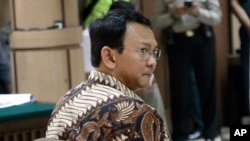Nearly 80 percent of Islamic education teachers in five of 34 Indonesian provinces support implementing Sharia law, according to a new survey that is causing alarm among some moderate Muslim groups.
Researchers led by Dr. Didin Syafruddin of Syarif Hidayatullah State Islamic University (UIN) in Jakarta interviewed 505 Islamic religious education (Pendidikan Agama Islam) teachers in five of Indonesia's 34 provinces. In much of Indonesia, religion is taught in public and private schools.
The study, conducted in October 2016, found high levels of so-called "Islamization" in those teachers it spoke with, including in the cities of Solo and Makassar, and in the Aceh Besar region, Syafruddin said.
Among the study's findings: 74 percent of Islamic religious teachers in the five provinces believe Muslims shouldn't give holiday greetings to adherents of other religions, and 89 percent believe non-Sunni minorities should not be accommodated in the country.
One Islamic education teacher quoted in Syafruddin's study said, "For a Muslim to uphold his ideals, Islamic Sharia law should be enforced. For me, the important thing is not the formal state, but enforcing Islamic Sharia. ... I think Islamic Sharia should be implemented in Islamic countries."
Moderate Muslims
The research has provoked alarm among moderate Muslim bodies such as Nahdlatul Ulama (NU) and Muhammadiyah.
At a panel organized at UIN for the study's publication last week, Nahdlatul Ulama (NU) Chairman H. Imam Aziz said according to NU, "Indonesia is a country where Pancasila and the 1945 constitution fully account for our notion of jurisprudence. There’s no need to search for another basis of state authority [such as Sharia law]."
Pancasila is the country's philosophical foundation of political pluralism.
Aziz said he found the study's findings "troubling."
Syafruddin, the study's author, told VOA he "was interested in exploring the balance between two values: Indonesia’s Pancasila philosophy of political pluralism and personal religion.”
He told VOA he suspected Pancasila was enforced only nominally and lacked strong personal investment. "I was not surprised by our findings, but it is useful to have some data about this phenomenon," he said.
Syafruddin said his survey purposely looked at some of the most conservative regions of Indonesia, and thus couldn't be proportionally extended to the whole country.
Other studies
But Bonar Tigor Naipospos, deputy chairman of the Setara Institute, a human rights research organization, said the latest "findings are in line with our survey among students in Greater Jakarta from a few years ago, where we found about 40 percent of them (Islamic educators) support implementing Islamic Sharia law."
"It has long been a concern of ours that schools are engendering the spread of puritanical and intolerant Islam. We even found that there were some authorized textbooks that sanctioned violence to defend religious beliefs," Naipospos said.
Only one Indonesian province has been allowed to impose formal Sharia law - the westernmost province of Aceh. But as of March 2016, there were 389 "Islam-inspired" local bylaws around the country, according to the National Commission on Violence Against Women.
Syafruddin’s research also found that teachers who studied Islam as a teenager were about four times as likely to support political Islam - Sharia law and exclusive Muslim leadership - as those who studied the religion as a child or an adult.
“Further research is needed, but I conjecture that this may be because teens are very impressionable and receptive to dogmatic ideas passed on by friends,” Syafruddin said.
It also may explain why teachers who studied Islam in adolescence support Sharia law at a higher rate than their peers, he added.
Religion is increasingly an academic as well as professional vocation for young Indonesians.
About 20 percent of all university students major in religious studies, The New York Times newspaper reported.
Indonesia also has the largest number of Islamic education centers in the world: nearly 700 universities, 30,000 boarding schools and 76,000 schools, according to the country’s Religious Affairs Ministry.
Suggestions for the government
Syafruddin said he also wanted to study attitudes toward religious minorities.
Indonesia has the largest population of Muslims - 203 million, 99 percent of whom are Sunni - in the world. The country, which has a total population of about 250 million people, also recognizes and protects Christianity, Hinduism, Judaism, Buddhism and Confucianism.
Based on his study, Syafruddin suggested that "religious tolerance is still superficial, and not actively enforced" in the country.
He said Indonesia should be more aggressive in explaining how Pancasila relates to tolerant Islam, support moderate Islamic organizations such as NU, and improve the recruitment and training of religious teachers "in a way that strengthens a moderate Islamic outlook unique to Indonesia."
In recent years, the Setara Institute has begun to do just that.
“A number of NGOs, including ours, train teachers and students about multiculturalism and peace,” Naipospos, of the human rights group, said. “We publish teaching materials for the classroom and picture books for students. Indonesia’s Ministries of Education and Religion have also started programs to address growing intolerance.”
The study was published last week during a time of turmoil that is testing Indonesia’s famed religious tolerance: the trial of Jakarta’s Chinese Christian Governor Basuki Tjahaja Purnama, known by his nickname Ahok, for alleged blasphemy. The case has polarized hard line Islamic groups and left some Christian minorities on edge.
The study was not directly prompted by the Ahok debate, Syafruddin said, but its findings about religious intolerance are relevant to the sectarian undercurrents that have surfaced over the past few months.
One of the teachers quoted in the study, however, commented on the case specifically.
“If there are non-Muslim [political] leaders, I do not support them,” a teacher in Pidie, Aceh said. “For we must protect our leaders, but such leaders would not protect us. This is evident from Jakarta. I don’t support Ahok as governor …because any other religion has a different mission than Islam. There is no obligation for Muslims to Islamize people, but in Christianity, they are missionaries. If they become president, they will Christianize our laws, education …all of that.”







